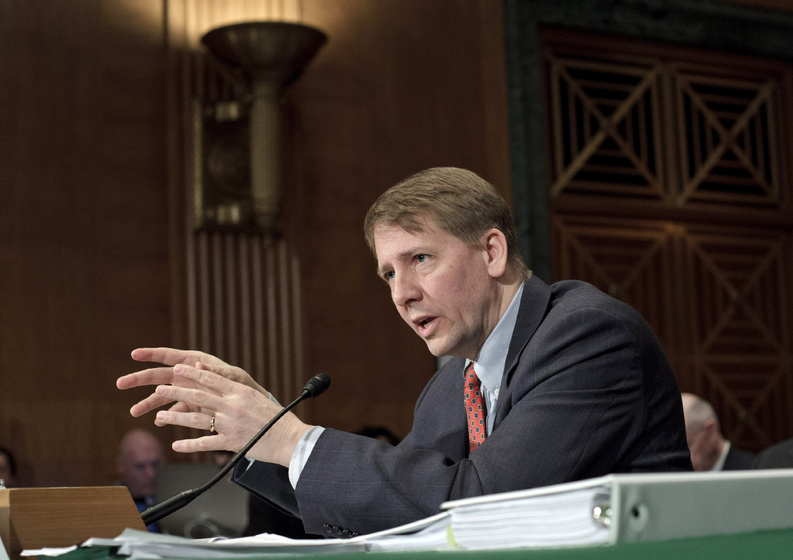The new federal agency charged with enforcing consumer finance laws is emerging as an ambitious sheriff, taking on companies for deceptive fees and marketing and unmoved by protests that its tactics go too far.
In the 14 months that it has existed, the Consumer Financial Protection Bureau has launched dozens of enforcement probes and issued more than 100 subpoenas demanding data, testimony and marketing materials – sometimes amounting to millions of pages – from companies that include credit card lenders, for-profit colleges and mortgage servicers.
More than two dozen interviews with agency officials and industry executives offered sweeping insight into the new agency’s behind-the-scenes efforts, which have caught the financial industry off guard and have been far more aggressive than previously known.
The number of subpoenas and probes was confirmed by agency, industry and trade group officials who spoke to The Associated Press on condition of anonymity because the subpoenas bar both sides from discussing them.
The bureau’s actions have many banks, payday lenders and credit card companies racing to adjust. They’re tightening their record-keeping and are budgeting for defense lawyers, according to attorneys and trade group executives who work with them. The companies themselves are reluctant to discuss the bureau because they don’t want to be seen as criticizing a regulator that is still choosing its battles.
The financial crisis of 2008 led to far-reaching changes to how the U.S. government oversees financial companies. The consumer bureau, created by the 2010 financial overhaul law known as the Dodd-Frank Act, gained new powers to reach deep into the most mundane decisions of money-transfer agents, auto lenders and virtually anyone else who provides financial products and services.
For regular Americans, the bureau is the most visible result of the shake-up in financial oversight. Its decisions are changing the mortgage application and foreclosure process, the way people lodge complaints against financial companies and, in some cases, what fees they can be charged.
“The CFPB is a new animal, and they have to establish their turf and a way of doing business,” said Jack Conway, the attorney general of Kentucky and an outspoken critic of for-profit colleges. “If that breaks from standard practice of other regulators, I don’t have a huge problem with it.”
For companies, the bureau embodies a bitter debate over whether the government has gone too far, imposing huge costs on firms that already operate legally but now must prove it. Why should regulators increase companies’ costs, critics ask, in an economy that has many struggling to stay afloat?
Some industries, such as mortgage insurers and for-profit schools, are pushing back. They say the consumer bureau is redefining laws – deeming as illegal some practices that were long acceptable to other regulators.
In other industries, the bureau’s subpoenas are spurring action. American Express, for example, is overhauling some marketing policies and setting aside money that it might be forced to refund to customers.
Questions about the bureau’s subpoenas and other enforcement tactics will likely come up Thursday morning, when bureau Director Richard Cordray is scheduled to testify before the Senate Banking Committee.
So far, the bureau’s aggressive approach has netted one high-profile win: an agreement by Capital One Financial, the fifth-biggest U.S. credit card issuer, to refund $150 million in fees directly to the accounts of 2.5 million customers – without the complicated paperwork often associated with class-action settlements on behalf of consumers.
In July, the bureau accused Capital One’s sales team of tricking customers into buying add-on services like credit protection and identity theft protection. Phone agents told people the services were free or mandatory or offered more benefits than they did, the government said.
Capital One also agreed to pay fines of $25 million to the CFPB and $35 million to the Office of the Comptroller of the Currency, a separate federal agency that oversees its banking operations. The company did not admit any wrongdoing.
As part of the same probe, officials are scrutinizing at least three other companies, according to public filings: card issuers American Express and Discover Financial Services; and Intersections Inc., which provides the add-on services sold by banks.
As it pursues its investigations, the consumer agency is using its bully pulpit to discourage abuse of consumers and encourage better financial disclosure. Announcing the action against Capital One, for example, Cordray said the agency had put “all financial institutions on notice about these prohibited practices” by warning consumers to question add-on fees.
Send questions/comments to the editors.



Success. Please wait for the page to reload. If the page does not reload within 5 seconds, please refresh the page.
Enter your email and password to access comments.
Hi, to comment on stories you must . This profile is in addition to your subscription and website login.
Already have a commenting profile? .
Invalid username/password.
Please check your email to confirm and complete your registration.
Only subscribers are eligible to post comments. Please subscribe or login first for digital access. Here’s why.
Use the form below to reset your password. When you've submitted your account email, we will send an email with a reset code.